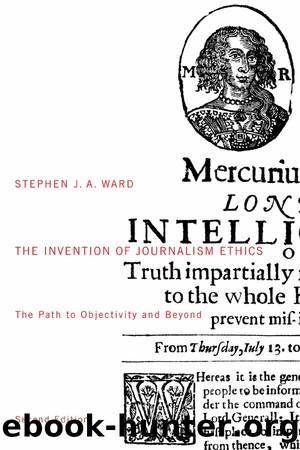The Invention of Journalism Ethics, Second Edition by Ward Stephen J. A.;

Author:Ward, Stephen J. A.;
Language: eng
Format: epub
Publisher: McGill-Queen's University Press
Published: 2015-01-01T00:00:00+00:00
Calls for professionalism were also a reply to press criticism, which became popular in the nineteenth century. A trickle of articles on journalism early in the century swelled into a stream of books, magazine articles, and speeches by the late 1880s. Early American commentators, like their British counterparts, talked idealistically about the press. Whereas British critics tended to accept partisanship, US critics argued that it tainted journalism. Edwin Godkin, founder of the Nation, noted in 1865 that the reporter should give to civilization âa plain, unvarnished, and veracious account of itself.â82
The first full book of criticism appeared in 1859. It was Our Press Gang or A Complete Exposition of the Corruptions and Crimes of the American Newspapers, by veteran journalist Lambert Wilmer. Wilmer accused the press of provoking violence among the ârabble,â and he decried press subservience to corrupt, monied interests. The first article of American press criticism to use the word âethicsâ in its title appeared in 1889 â âThe Ethics of Journalism.â83
In Britain, conservative periodicals worried about the pressâs abuses, its effect on morals and on women, and the influence of its âunrestrained discussion of public affairsâ on the masses. These concerns were part of a long tradition of elite criticism. From the 1850s on, many intellectuals, politicians, and editors of an elite press poured scorn on a cheaper labour press. Then they turned on the popular papers, which addressed readers who were neither fully respectable nor radical. Elite editors such as J.F. Stephen rejected the ânew journalismâ for pandering to a busy public with intellectual mincemeat: âTheir food must be chopped up small before they eat it; and it must be so prepared as at once to tempt the appetite, and assist the digestion.â84 Matthew Arnold, as we saw above, called the popular press âfeather-brained.â John Ruskin rejected the âdirty printed falsehood every morning at breakfast.â When Charles Dickens visited the United States in 1842, he objected to popular journalism as an âevilâ power spreading âodium.â85 Anthony Trollope satirized the âfourth estateâ as a Mount Olympus that issued âthe only known infallible bulls for the guidance of British souls and bodies.â86 The same criticism surfaced against other forms of mass media as they appeared â the music hall, cinema, phonograph, and radio.
Media commentary turned bitter as the century ended. Over 100 magazine articles on the press appeared in the United States during the 1890s. Shumanâs Steps condemned âindependent journalismâ for selling out standards for profits. Had the free press exchanged one master, the political party, for another, the corporate interest? Had the sensational press abandoned its liberal heritage of acting as a serious educator?
Major assumptions of the liberal theory of the press were in question. One could no longer assume a free press would propagate elevating opinion. Also, it was no longer evident that the formulation of public opinion through the press would lead to the triumph of the most rational, progressive ideas. The liberal paper was no longer omnipotent or extravagantly praised. A magazine article said in 1902: âNo other profession is so wept over.
Download
This site does not store any files on its server. We only index and link to content provided by other sites. Please contact the content providers to delete copyright contents if any and email us, we'll remove relevant links or contents immediately.
| Ethics | Etiquette |
| Fashion & Image | Health & Stress |
| Motivation & Self-Improvement | Work Life Balance |
| Workplace Culture |
Tools of Titans by Timothy Ferriss(8363)
Change Your Questions, Change Your Life by Marilee Adams(7756)
Deep Work by Cal Newport(7063)
Playing to Win_ How Strategy Really Works by A.G. Lafley & Roger L. Martin(6225)
Man-made Catastrophes and Risk Information Concealment by Dmitry Chernov & Didier Sornette(6002)
Big Magic: Creative Living Beyond Fear by Elizabeth Gilbert(5753)
Digital Minimalism by Cal Newport;(5747)
Ego Is the Enemy by Ryan Holiday(5412)
The Slight Edge by Jeff Olson(5410)
The Motivation Myth by Jeff Haden(5203)
The Laws of Human Nature by Robert Greene(5170)
Stone's Rules by Roger Stone(5080)
Tuesdays with Morrie by Mitch Albom(4767)
Eat That Frog! by Brian Tracy(4522)
Rising Strong by Brene Brown(4448)
Skin in the Game by Nassim Nicholas Taleb(4235)
The Money Culture by Michael Lewis(4196)
Bullshit Jobs by David Graeber(4179)
Skin in the Game: Hidden Asymmetries in Daily Life by Nassim Nicholas Taleb(3987)
